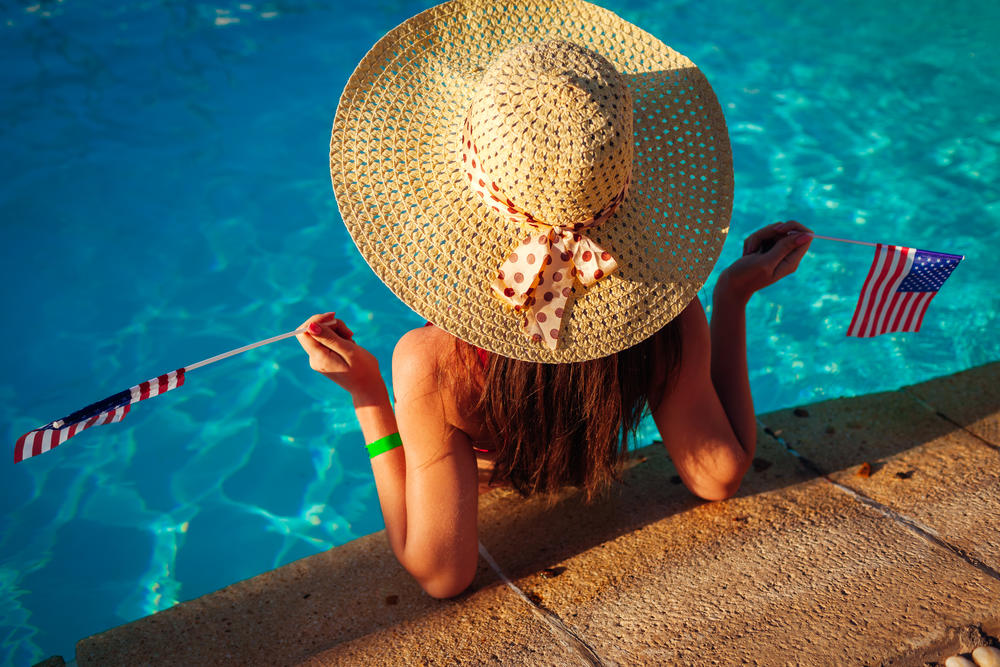
In the sun or near the water, have a healthy July Fourth

By Julie Jordan
Published July 2, 2019
The Fourth of July is a time for celebrating with family and friends. Common festivities are grilling out, fireworks and swimming. Many activities are in the sun or near the water, and many begin before sundown. However you’re celebrating, remember these best practices for a happy and healthy Fourth of July.
The sun is a risk to your to skin, eyes and hydration. Take these preventive measures to stay healthy in the sun:
- Protect your skin with sunscreen, clothing and a hat. Even darker-skinned individuals are at risk for skin cancer, which can be deadly. Wear sunscreen with an SPF (sun protection factor) of 15 or higher, and protective clothing, to shield your skin. Reapply sunscreen at least every 2 hours. Remember sweat and getting wet will cause your sunscreen to wear off. Be sure to reapply it.
- Seek shade during midday hours from 10 a.m. to 4 p.m. when the sun is most powerful.
- Protect your skin also when around surfaces that reflect the sun’s rays (and harm your skin) like sand, water and concrete.
- Make sure to wear sunglasses with UV (ultraviolet) protection. Being out in the summer sun will strain your eyes, and put you at risk for cataracts and other eye problems.
- Wear a long-sleeved shirt and pants, or a long skirt, for additional protection when possible, or try wearing a T-shirt or beach cover-up.
- Avoid prolonged exposure to the heat, and limit strenuous outdoor activity to prevent heat-related illness when summer temperatures reach the mid-90s and above.
- Drink more water. Stay hydrated, regardless of your activity level. Don’t wait until you’re thirsty to re-hydrate. Don’t drink liquids that cause you to lose more body fluid like alcohol, coffee or sugary drinks.
- Stay in an air-conditioned place, and wear lightweight, light-colored, loose-fitting clothing. Remember that taking a cool shower or bath is a more effective way to cool off than using fans.
- Want to look younger, longer? The sun and indoor tanning will age your skin with damage, wrinkles and age spots. Wear sunscreen, protect your skin and avoid indoor tanning.
If your Fourth of July celebration includes cooling off at the beach, a lake or the pool, swim safely. According to the Centers for Disease Control and Prevention, every day about 10 people die from unintentional drowning, and two are children ages 14 and under. Evaluate your swimming ability and the water’s quality before diving in. Better swimming skills mean safer swimming. Remember these tips:
- Take swim lessons.
- Don't swim if you have diarrhea.
- Use these pool safety tips. And remember to check the pool, check yourself and protect yourself and others.
When swimming in oceans, lakes or rivers:
- For oceans, find information about your beach (closings, health advisories and water quality) through the U.S. Environmental Protection Agency.
- For lakes and rivers, limit the amount of water going up the nose in case of Naegleria fowleri.
- In freshwater, marine water and brackish water, Harmful Algal Blooms may be found. A HAB can produce poisonous toxins that may cause HAB-Associated illness in humans, animals and wildlife. Follow local state guidance and avoid entering or playing in water that smells bad, looks discolored, has foam or contains dead fish.
Utilize the buddy system. Swimming without taking the proper precautions can lead to waterborne illness (germs spread by contaminated water), drowning and entrapment injuries.
A responsible adult should watch young children swimming or playing around water. Those watching children of pre-school age or younger should provide “touch supervision” or be close enough to reach the child always.
Parents should provide swim lessons for their children, and the elderly should consult with their physician before swimming.